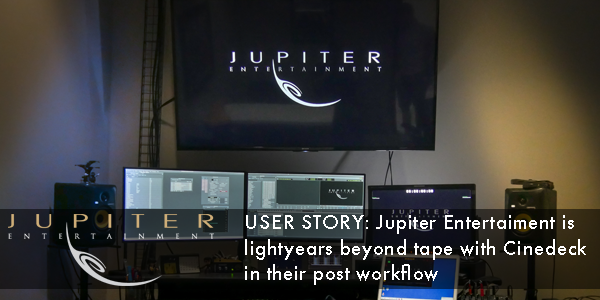

Jupiter Entertainment has been making engaging television for over twenty years. In 1996, CEO and Executive Producer, Stephen Land put together a small team of creatives dedicated to great storytelling, compelling characters and high production values. Critically acclaimed “City Confidential” was Jupiter Entertainment’s first major breakthrough, airing on A&E into the early 2000s. And it’s this show that started Jupiter on its path to becoming a leader in nonfiction content creation, especially for the true-crime genre.
Since its inception, Jupiter has created multiple hit series and specials for a broad variety of outlets such as Discovery Channel, History Channel, Oxygen, TLC, Nat Geo and many more. With true crime as a core specialty, Jupiter has grown their brand of exceptional storytelling into a company with offices in New York City and Knoxville Tennessee and when needed, satellite operations in cities like Los Angeles. Editorial is split between locations while Knoxville is the operational hub, managing final online editing and deliverables. Two key team members in Knoxville creating final deliverables are Jeremy Ashcraft, Deliverables Manager, and John Mecklenborg, Sr. Online Editor. “In the early days, Jupiter delivered about 50 hours of programming each year,” tells Jeremy. “For the last five or so years, we have been delivering upwards of 200 hours per year for US domestic and international distribution – it’s been a pretty amazing growth that really keeps us on our toes.”
Jeremy continues, “As Jupiter Entertainment grew, more and more customers began asking for files instead of tapes.” John adds, “Tape workflows are tried and true and standardized while file based delivery can be a real mixed bag. And more importantly, making a fix to a tape is as simple as dropping in a new shot from the timeline. That same fix for a file could take us hours.” Jeremy picks up on this comment, “An SRW tape is a SRW tape, there is basically just the one choice. But with files, some customers are happy with a ‘same as source’ DNx export from Avid, while others want completely different flavors like ProRes or they have an additional need such as H.264 files. As file deliverables became the norm, we were faced with supporting workflows going in multiple directions.”
Like many, transitioning to file deliverables became an even more pressing concern post-tsunami, with the ensuing worldwide shortage of tape stock and the increasing difficulty of maintaining tape decks. A few short years later, in April of 2014, a member of the Jupiter team was browsing the NAB show floor and happened across the Cinedeck stand. Attracted by the promise of insert editing, a key feature of tape delivery keenly missing with files, an onsite evaluation was quickly set up to see whether insert-editing to files was as real as Cinedeck claimed.
Shortly after the evaluation, Jupiter purchased their first Cinedeck ZX. Jeremy recalls, “Long story short, we got a demo and insert edit was really a ‘wow’ moment. The ZX and insert-edit has become central to our workflow because it’s everything tape offered, minus the astronomical cost of tape stock and tapedeck maintenance. In fact. we probably paid for the deck within the first year with the savings on tape stock.” Online editor, John Mecklenborg, adds, “Coincidently, we are moving further into longer form episodes. Exporting and QC-ing a two or three-hour show takes all day so being able to insert fixes into show masters is just fantastic. There have also been times when being able to insert-edit to files has really gotten us out of a pickle!”
Recently, John was handed an online project for a new customer with a challenging delivery spec and a quick turnaround. “The requirement was for a ProRes file with 24 channels of audio and it was kind of an ‘Oh Crap’ moment,” recalls John. “But the training I received from Cinedeck paid off – I knew there was a way to get there. Creating the ProRes was no problem and I used the track re-mapping tool and insert edit to create the deliverable exactly to spec. It was an 11th hour save that simply would not have happened without the Cinedeck.”
The Cinedeck user interface also helps with standardization as a way to reduce errors. A relieved Deliverables Manager, Jeremy Ashcraft tells, “Before we had the Cinedeck, assistants would sometimes generate an export with one or more wrong settings which meant re-exporting the show again. Now, John has set up series based projects so whoever is doing the Digital Cut just loads the project and off they go. It means a lot less headaches.”
Because it’s intuitive to operate, Jupiter has also found uses for Cinedeck outside the edit room. “One or more times a day, I’m required to send a clip to someone on our team. It might be a writer or producer that needs to review a scene or the promo department needs a segment,” Jeremy explains. “I can easily load up a show on Cinedeck, dub off whatever I need in any format they want, all without tying up an editor and an edit bay. Cinedeck is not a ‘one trick pony’; we continue to create new workflows around Cinedeck that would have otherwise been slower or more cumbersome.”
“We still occasionally deliver a tape but given the choice, it’s a no brainer for us to create files and use the Cinedeck to do it. In fact, it’s in our budget to add a second Cinedeck when our volume increases. Lastly, I’d like to add that it’s great working with a manufacturer that listens, is open to feedback and really understands what production people do,” says Jeremy. “I guess the only downside to using Cinedeck is I’m not getting my steps in since I have the Cinedeck UI over VNC in my bay and I don’t have any more breaks waiting for the tape to queue,” quips John.
ABOUT JUPITER ENTERTAINMENT</strong>Jupiter Entertainment has an enviable track record of creating successful, highly formatted series with outstanding ratings and strong renewals. From explosive docusoaps like TLC’s Welcome to Myrtle Manor, and Animal Planet’s Wild West Alaska to long-running series like Snapped (Oxygen) and ID’s hit series Homicide Hunter, Jupiter has been successful in producing a wide variety of genres and formats by focusing on the timeless ingredients of great storytelling, compelling characters, and high production values.

